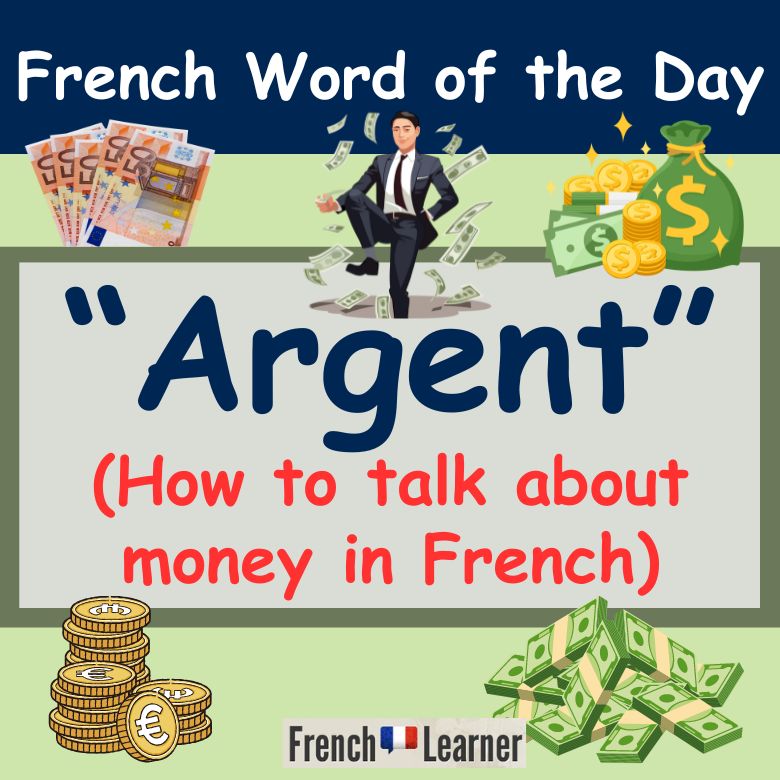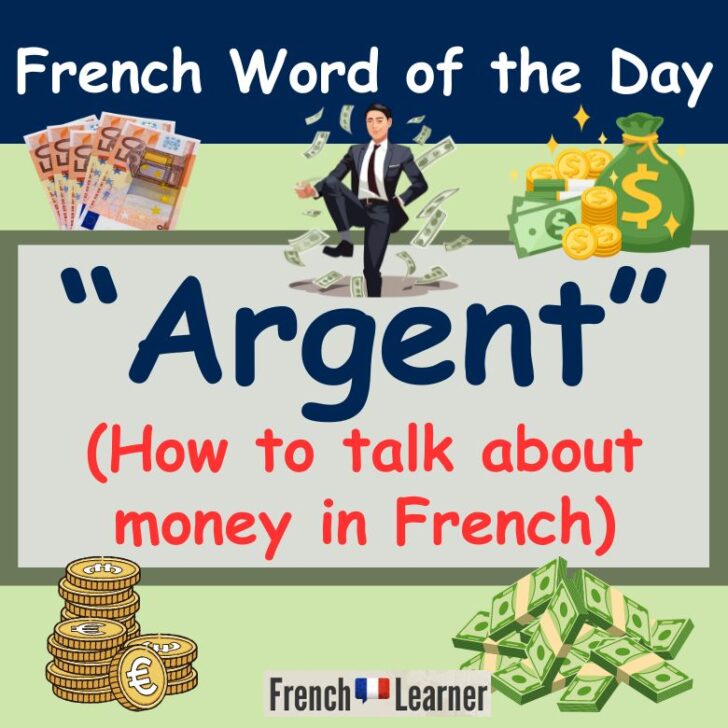In French, the word for money is argent (Literal meaning: silver). While it’s somewhat taboo to boast about money in French culture and sources of one’s revenue, it’s still a good idea to know the related vocabulary and common phrases.

Argent Meaning & Translation – Money in French
The word for money is French is argent The -ar is very straight forward while the -gent is a soft -g combined with the nasal -en sound.
- J’ai de l’argent dans ma poche. I have some money in my pocket.
Argent vs. monnaie
It’s easy to confuse the words argent and monnaie. It would appear that monnaie also means money as the two words are very similar. However, this is a false cognate (faux ami). Monnaie in French means change, as in coins.
Monnaie has a second meaning in French: currency.
- Gardez la monnaie. Keep the change.
- Les deux pays ont la même monnaie. Both countries have the same currency.
Slang words for money
Les sous is an interesting word. It’s both a slang for for money and can also translate loosely to a few coins or spare change.
- Je travaille pour gagner un peu de sous. I work to earn some money.
French has many other slang words for money including le fric, les ronds, la tune and l’oseille. All of the words equate to slang words in English for money such as “dought”.
Interestingly, these slang words for money are also used in slang expressions for rich or “filthy rich”.
- Il a beaucoup de fric. He’s got a lot of dough.
- Il est pété de tunes. He’s loaded.
In French, balle is the slang for for “bucks” or “quid” in the UK.
- Le café coûte deux balles. It costs two bucks. Balle also translates to bullet or small ball (as in a tennis ball).
French has several adjectives for “broke” including fauché and raide. Another common expression for being broke is être dans la dèche (to be down and out).
- Mon ami est fauché. My friend is broke.
Talking about money in French
Euro – currency in France
The currency in France is the Euro. The word euro can be difficult to pronounce in French. The word for cent is centime.
- Ça coûte cinq euros. It costs €5.
- Ça coûte vingt euros et cinquante centimes. It costs €20,50.
To earn and to spend
The verbs associated with making and spending money are gagner de l’argent (to make money) and dépenser de l’argent (to spend money). Here are some example sentences:
To save
French has two main verbs associated with “saving” money: économiser and épagner. The two verbs have slightly different usages. Économiser means to take actions in order to spend less while épagner has more to do with saving money in a savings account. Examples:
- J’économise au supermarché en utilisant des coupons. I save in the supermarket by using coupons.
- Papa épargne pour l’éducation des enfants. Dad saves (sets aside) money for this kids’ education.
Lending and borrowing
The verbs for to lend and to borrow are prêter and emprunter. Both verbs are followed by the preposition à.
- Je prête cinq euros à mon ami. I lend five euros to my friend.
- J’emprunte la voiture à mon ami. I borrow the car from my friend.
The verb dépanner means “to spot” or “to get out of a jam”.
- Tu peux me dépanner de dix balles? Can you lend me ten bucks?
Conclusion – money in French
Et voilà! Now you have the basic idea and and can talk about about money in French! Now check our our lesson covering French numbers 1-100!


